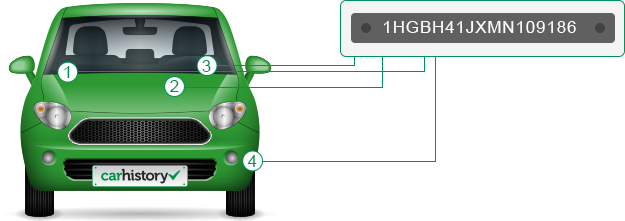
The vehicle identification number (VIN) is composed of 17 characters (digits and capital letters) that act as a unique identifier for the vehicle. A VIN displays the car's unique features, specifications and manufacturer.
The VIN can be found in a couple of places including on the car's registration label (1), on the compliance plate in the engine bay (2) or on the passenger side windshield (3), or on one of the door posts (where the door latches when it is closed) (4). See the image below:
PPSR Vehicle Check
A PPSR vehicle check is an important part of the used car purchase process, and should be factored into your budget.
As a buyer, it’s hard to know if the information presented on a car sale listing is genuine – especially if you’re purchasing remotely. Investing in a PPSR REVS check and researching the history of a prospective car before buying is a great way to check if sales information is honest, so you can avoid wasting time and money.
We offer both standard and premium PPSR vehicle check report services. If you’re after the comprehensive history of a vehicle, our CarHistory report will give you the lowdown on the following:
Our standard report offers a breakdown of manufacturer specifications, a stolen car and damage check, and gives you a government-generated PPSR certificate verifying the current financial encumbrance status of the vehicle.
To view a sample PPSR report or get ahead of the game and run your PPSR vehicle check, try our REVS check online today.
The first and most important thing you’ll need to conduct a PPSR vehicle check is the vehicle registration number or vehicle identification number (VIN).
The VIN is a unique 17-digit serial number which acts as an identification for an individual car. Introduced by the automotive industry as a way to ensure consumer safety and manufacturer accountability, the 17-digit VIN is a legal requirement and can be found on any car built after 1989.
Every vehicle has a unique VIN, making its movements relatively easy to track. As a result, if your car is recalled, the manufacturer and relevant government authority will be able to easily notify you and ensure your safety.
You can find the VIN in a number of places on a vehicle, but the easiest locations to see the VIN are on a car’s registration label, on the compliance plate in the engine bay, on the passenger-side windscreen, or on one of the doorposts (where the door latches when it is closed). Alternatively, you can look for its insurance card or policy.
The VIN is also recorded any time a car is undergoing repairs or modifications, is sold, registered, or insured – and that’s where we come in. Our PPSR REVS check allows you to access the comprehensive history of a vehicle before you buy it.
Once you’ve got the VIN, visit us online to complete your PPSR register check. Remember: the closer to the purchasing date that you run your PPSR vehicle check, the more current the information provided by the PPSR VIN check will be.
Once you’ve found the VIN, simply pop it into the VIN check bar located at the top right and bottom of our website and run your search. You’ll then be asked to choose your VIN lookup report type (standard or comprehensive) and to complete the necessary payment and contact details (required for delivery of the report).
In a few short minutes, you’ll have an easy-to-read PDF report delivered straight to your inbox with the information needed so you can make a well-informed decision on your vehicle purchase.